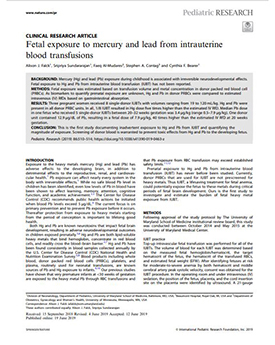Research Warrants New Protocol for Screening Fetal Donor Blood
Breakthrough Discovery Uncovers Fetal Exposure to Mercury and Lead Through Intrauterine Blood Transfusions and Necessitate Screening of Donor Blood
The neonatology team at University of Maryland Children's Hospital has conducted the first-ever study examining inadvertent fetal exposure to lead and mercury from intrauterine blood transfusions. Currently, donor packed red blood cells that are used for intrauterine blood transfusion are not prescreened for heavy metals. Therefore, the intrauterine blood transfusion, a lifesaving treatment for fetal anemia, could potentially expose the fetus to these metals during critical periods of fetal brain development.
Exposure to heavy metals mercury and lead has adverse effects to the developing brain, in addition to detrimental effects to the reproductive, renal, and cardiovascular health. Lead exposure can affect nearly every system in the body with irreversible effects. Even low levels of lead in blood affect learning, memory, attention, cognitive function, and academic achievement. Therefore, protection from exposure to heavy metals needs to start from conception.
The study followed three pregnant women who received a total of eight single-donor intrauterine blood transfusions for treatment of fetal anemia. Metal content in donor packed red blood cell segments measured were present in all units. In all, 1/8 intrauterine blood transfusions resulted in a mercury dose five times higher than the estimated intravenous reference doses. Median lead dose in one fetus who received five single-donor intrauterine blood transfusions between 20–32 weeks gestation was 3.4 μg/kg (normal range is 0.5–7.9 μg/kg). One donor unit resulted in a fetal dose of lead 40 times higher than the estimated intravenous reference dose at 20 weeks gestation.
This is the first study documenting inadvertent exposure to mercury and lead from intrauterine blood transfusion and quantifying the magnitude of exposure. Screening of donor blood is necessary to prevent toxic effects from mercury and lead to the developing fetus.
Read the entire white paper on this study.
Learn more about neonatology at University of Maryland Children's Hospital visit umm.edu/NICU.

